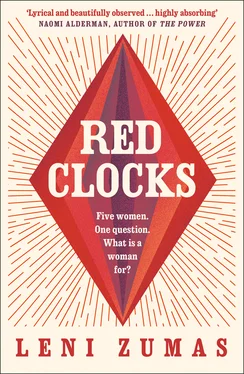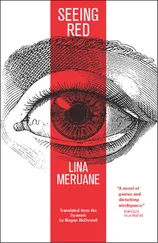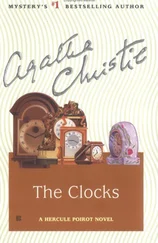“Fee fi fo fon, je sens le sang of two white middle-class Québécois-American children!” Her sprites scramble all over him. “A’right, a’right, settle down, eh,” but he is contented, with John flung over his shoulder and Bex pulling open the satchel to check for vending-machine snacks. She’s got his salt tooth. Did she get everything from him? What is in her of the wife?
The nose. She escaped Didier’s nose.
“Hi, meuf, ” he says, squatting to set John on the floor.
“How was the day?”
“Usual hell. Actually, not usual. Music teacher got laid off.”
Good .
“Hello, hell!” says Bex.
“We don’t say ‘hell,’” says the wife.
I’m glad she’s gone.
“Daddy—”
“I meant ‘heifer,’” says Didier.
“Kids, I want those blocks off the floor. Somebody could trip. Now! But I thought everyone loved the music teacher.”
“Budget crisis.”
“You mean they’re not replacing her?”
He shrugs.
“So there won’t be any music classes at all?”
“I must pee.”
When he emerges from the bathroom, she is leaning on the banister, listening to Bex boss John into doing all the block gathering.
“We should get a cleaner,” says Didier, for the third time this month. “I just counted the number of pubic hairs on the toilet rim.”
And soap heel crusted to the sink.
Black dust on the baseboards.
Soft yellow hair balls in every corner.
Sea-salt-almond chocolate bar in the drawer.
“We can’t afford one,” she says, “unless we stop using Mrs. Costello, and I’m not giving up those eight hours.” She looks into his blue-gray eyes, level with hers. She has often wished that Didier were taller. Is her wishing the product of socialization or an evolutionary adaptation from the days when being able to reach more food on a tree was a life‑or‑death advantage?
“Well,” he says, “ somebody needs to start doing some cleaning. It’s like a bus station in there.”
She won’t be asking him tonight.
She will write the A again, on a different day.
“There were twelve, by the way,” he says. “I know you have stuff to do, I’m not saying you don’t, but could you maybe wash the toilet once in a while? Twelve hairs.”
Red sky at morning, sailor take warning.
Can’t see the ocean from her apartment, but she can hear it. Most days between five and six thirty a.m. she sits in the kitchen listening to the waves and working on her study of Eivør Mínervudottír, a nineteenth-century polar hydrologist whose trailblazing research on pack ice was published under a male acquaintance’s name. There is no book on Mínervudottír, only passing mentions in other books. The biographer has a mass of notes by now, an outline, some paragraphs. A skein draft—more holes than words. On the kitchen wall she’s taped a photo of the shelf in the Salem bookstore where her book will live. The photo reminds her that she is going to finish it.
She opens Mínervudottír’s journal, translated from the Danish. I admit to fearing the attack of a sea bear; and my fingers hurt all the time. A woman long dead coming to life. But today, staring at the journal, the biographer can’t think. Her brain is soapy and throbbing from the new ovary medicine.
She sits in her car, radio on, throat shivering with hints of vomit, until she’s late enough for school not to care that her eye–foot–brake reaction time is slowed by the Ovutran. The roads have guardrails. Her forehead pulses hard. She sees a black lace throw itself across the windshield, and blinks it away.
Two years ago the United States Congress ratified the Personhood Amendment, which gives the constitutional right to life, liberty, and property to a fertilized egg at the moment of conception. Abortion is now illegal in all fifty states. Abortion providers can be charged with second-degree murder, abortion seekers with conspiracy to commit murder. In vitro fertilization, too, is federally banned, because the amendment outlaws the transfer of embryos from laboratory to uterus. (The embryos can’t give their consent to be moved.)
She was just quietly teaching history when it happened. Woke up one morning to a president-elect she hadn’t voted for. This man thought women who miscarried should pay for funerals for the fetal tissue and thought a lab technician who accidentally dropped an embryo during in vitro transfer was guilty of manslaughter. She had heard there was glee on the lawns of her father’s Orlando retirement village. Marching in the streets of Portland. In Newville: brackish calm.
Short of sex with some man she wouldn’t otherwise want to have sex with, Ovutran and lube-glopped vaginal wands and Dr. Kalbfleisch’s golden fingers is the only biological route left. Intrauterine insemination. At her age, not much better than a turkey baster.
She was placed on the adoption wait-list three years ago. In her parent profile she earnestly and meticulously described her job, her apartment, her favorite books, her parents, her brother (drug addiction omitted), and the fierce beauty of Newville. She uploaded a photograph that made her look friendly but responsible, fun loving but stable, easygoing but upper middle class. The coral-pink cardigan she bought to wear in this photo she later threw into the clothing donation bin outside the church.
She was warned, yes, at the outset: birth mothers tend to choose married straight couples, especially if the couple is white. But not all birth mothers choose this way. Anything could happen, she was told. The fact that she was willing to take an older child or a child who needed special care meant the odds were in her favor.
She assumed it would take a while but that it would, eventually, happen.
She thought a foster placement, at least, would come through; and if things went well, that could lead to adoption.
Then the new president moved into the White House.
The Personhood Amendment happened.
One of the ripples in its wake: Public Law 116‑72.
On January fifteenth—in less than three months—this law, also known as Every Child Needs Two, takes effect. Its mission: to restore dignity, strength, and prosperity to American families. Unmarried persons will be legally prohibited from adopting children. In addition to valid marriage licenses, all adoptions will require approval through a federally regulated agency, rendering private transactions criminal.
Woozy with Ovutran, inching up the steps of Central Coast Regional, the biographer recalls her high school career on the varsity track team. “Keep your legs, Stephens!” the coach would yell when her muscles were about to give out.
She informs the tenth-graders they must scrub their essay drafts clean of the phrase History tells us . “A stale rhetorical tic. Means nothing.”
“But it does,” says Mattie. “History is telling us not to repeat its mistakes.”
“We might reach that conclusion from studying the past, but history is a concept; it isn’t talking to us.”
Mattie’s cheeks—cold white, blue veined—go red. Not used to correction, she’s easily shamed.
Ash raises her hand. “What happened to your arm, miss?”
“What? Oh.” The biographer’s sleeve is pushed way up above the elbow. She yanks it down. “I gave blood.”
“It looks like you gave, like, gallons.” Ash rubs her piglet nose. “You should sue the blood bank for defamation.”
“Dis figure ment,” says Mattie.
“You got straight disfigured, miss.”
By noon the cloudy throb behind her eyebrows has dialed itself back. In the teachers’ lounge she eats maize puffs and watches the French teacher fork pink thumbs out of a Good Ship Chinese takeout box.
Читать дальше











